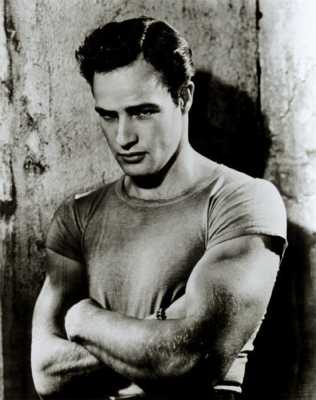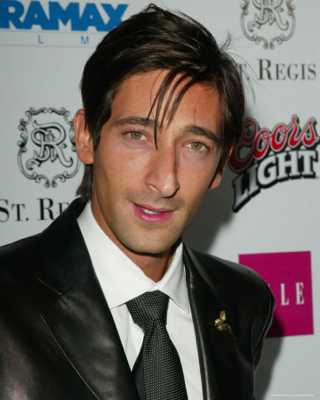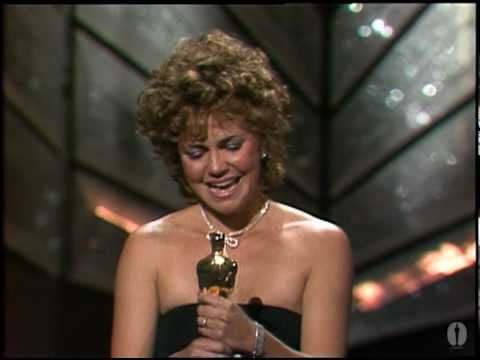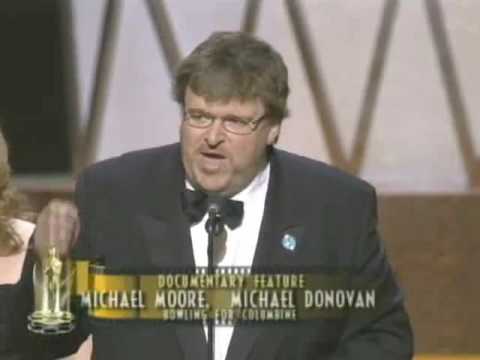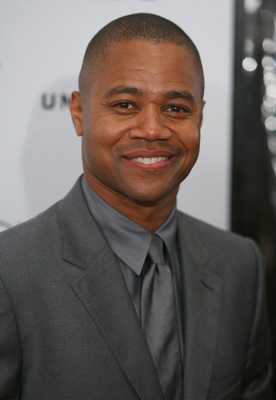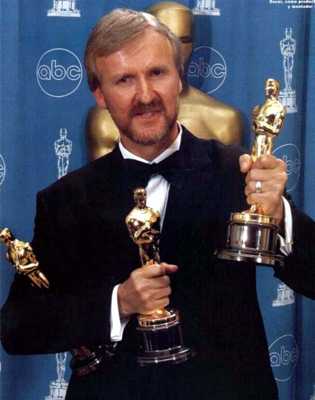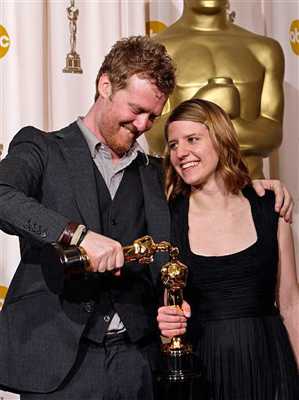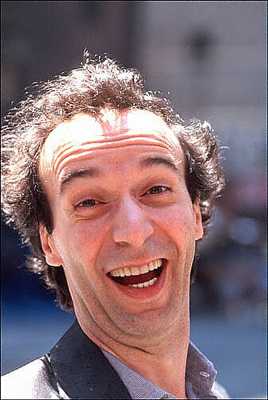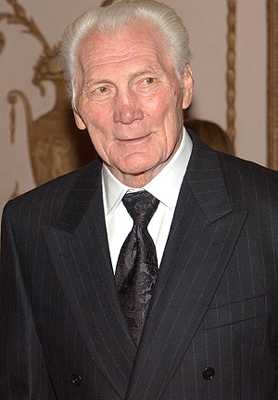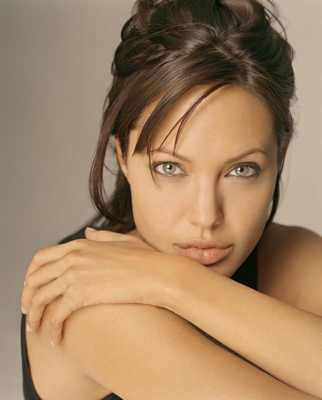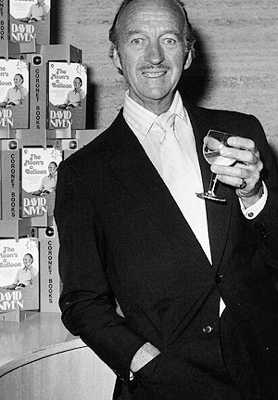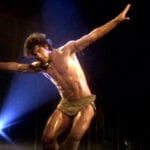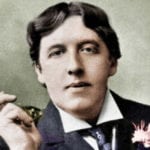[Watch the Clip] Legendary method actor Marlon Brando was no stranger to controversy, but it still came as quite a shock at the 45th annual Academy Awards show when he boycotted the ceremony and sent American Indian Rights activist, Sacheen Littlefeather, in his stead. When Brando’s name was called as winner of the coveted Best Actor award, Littlefeather took to the stage dressed in traditional Apache clothing, refused the proffered Oscar trophy with a polite wave of her hand, and read a brief statement explaining that Brando would not accept the award in order to protest the manner in which Native Americans were portrayed in the entertainment industry.
[Watch the Clip] Accepting the award at age 29, Adrien Brody is the youngest recipient of the Best Actor Academy Award to date, so maybe it’s only fitting that his acceptance speech was filled with youthful exuberance. As Brody bounded onto the podium he took presenter Halle Berry in his arms, tilted her back and planted a passionate Hollywood kiss on her lips. Both Berry and the audience were left breathless (but smiling) by Brody’s spontaneous act of enthusiasm.
Fewer acceptance speeches are better known than this one. When Sally Field won this, her second Academy Award, she spent much of her allotted time at the mic gushing about finally feeling respected as an actor and how much better it felt to win this award than it had felt to win her first (for 1979’s Norma Ray). Field finished her heart-felt, but rather awkward, acceptance speech with the oft-misquoted line, “I can’t deny the fact that you like me, right now, you like me!” Though the line was relentlessly parodied (even by Field herself), few people realized that she was actually quoting the line, “You like me,” from Norma Ray.
Filmmaker Michael Moore is well known to be outspoken about his left-wing political views, yet he still shocked the Academy when he chose to chastise then-President, George W. Bush, during his acceptance speech for the 2003 documentary Bowling For Columbine. Instead of the standard thank-yous and acknowledgments, Moore brought his fellow nominees on stage with him and voiced their collective opposition to the U.S. invasion of Iraq, that had begun just days before, saying, “…we are against this war, Mr. Bush. Shame on you, Mr. Bush, shame on you. And, whenever you’ve got the Pope and the Dixie Chicks against you, your time is up.” Moore’s speech was met by equal parts cheering and booing from the crowd.
[Watch the Clip] One thing is clear about watching Cuba Gooding Jr. receive his Best Supporting Actor trophy: he was ecstatic. Gooding’s earnest acceptance speech, during which he thanks his family and God first and foremost, is a noteworthy case of capturing pure joy on camera. As the music began to play him off Gooding started shouting “I love you” to everyone who had worked on the movie, bringing the smiling, cheering crowd to their feet in a standing ovation.
[Watch the Clip] After delivering what would have been a pleasant, rather mundane acceptance speech for his Best Director award, James Cameron unwisely quoted his multi-award winning blockbuster, Titanic, by blurting out, “I’m the king of the world!” followed by a series of whoo-hoos. Hearing Cameron spout the line was undeniably awkward; perhaps it just didn’t sound as good when it wasn’t said by Leonardo DiCaprio.
[Watch the Clip] After actor/musician Glen Hansard made a brief, but humble and heartfelt, speech, he stepped back to allow his co-star Markéta Irglová to say her piece. Unfortunately, Irglová’s microphone was abruptly cut off and the music swelled, leaving her with no choice but to leave the stage without saying a word. Thankfully, when the telecast returned from commercial break host Jon Stewart brought Irglová back onto the stage to have her moment. She then took a few moments to give a lovely speech in which she urged fellow young people to “Make art!”
[Watch the Clip] When Roberto Benigni’s name was called, he didn’t stand up and walk down the aisle like everybody else does. Oh no. Benigni instead chose to stand on the backs of the chairs and climb over countless celebs on his way to the stage; he then hopped up the stairs like a child and let loose with a jubilant, but only partially-coherent, jumble of thickly-accented English mixed with Italian. During his infamously-odd speech, Benigni quoted poetry and thanked his parents for “the biggest gift: poverty.” He ended with the oddest quote of all, saying, “I am not able to express all my gratitude because now, my body is in tumult because it is a colossal moment of joy. … I would like to be Jupiter. And kidnap everybody and lie down in the firmament making love to everyone.”
[Watch the Clip] Just in case you didn’t know, Jack Palance was kind of a bad-ass. A first-time Oscar winner at age 73, Palance delivered a charming and funny speech before inexplicably dropping to the floor and proving that he was still stronger than most men half his age. Palance did three or four push-ups before returning to the podium to finish his speech, dropping a few bawdy jokes along the way.
[Watch the Clip] Remember when Angelina Jolie brought her brother, James Haven, to the Oscars as her date? Remember when they practically made out on the red carpet? Just when we didn’t think it could get any worse, Jolie (in strange Morticia Addams garb) got up on stage and declared that she was, “…just so in love with my brother right now.” Jolie’s PDA and speech about “brotherly-love” raised several eyebrows that night, and cemented her place on the list of memorable Oscar acceptance speeches for many years to come.
[Watch the Clip] Okay, this isn’t an acceptance speech, but I simply must include it. In 1974, as respected actor David Niven presented an award, a nude streaker ran behind him. Niven, ever a gentleman, remained poised and famously quipped, “Probably the only laugh that man will ever get in his life is by stripping off and showing off his short-comings.” Note: Choosing just ten acceptance speeches was no easy feat. Other noteworthy speeches were made by Vanessa Redgrave with her reproach of “Zionist hoodlums” in 1978, and Tom Hanks publicly outing his gay drama teacher, in 1994.
